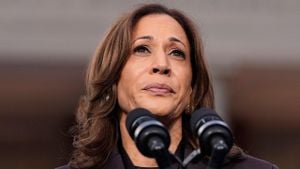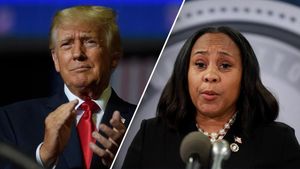Imran Khan, Pakistan's former prime minister, remains at the center of political turmoil as thousands of his supporters continue to protest against his imprisonment. These demonstrations have unfolded under increasingly tense circumstances, marked by government-imposed lockdowns, street clashes, and widespread arrests.
Since his incarceration over 150 criminal charges, activists have accused the government of targeting Khan for his political ambitions. His supporters are adamant about their belief: the charges are nothing more than political maneuvering by his opponents. The situation has intensified, with recent protests seeing masked supporters remove shipping containers blocking key roads, symbolically pushing back against the government's attempts to suppress the movement.
At the heart of these protests lies Khan's enduring popularity—a reputation forged during his tenure and his earlier success as the captain of Pakistan's cricket team. His time as prime minister, which began with the promise of 'Naya Pakistan' or 'New Pakistan,' aimed to reshape the political order dominated for decades by the Pakistan People’s Party (PPP) and the Pakistan Muslim League-Nawaz (PML-N). Despite his current legal troubles, many of his supporters see him as a beacon of hope for change.
The recent events are not isolated instances but rather part of Khan's tumultuous political career, marred by fierce opposition and government crackdowns. Following his dismissal from office via a vote of no confidence, Khan's narrative transformed from one of governance to one of victimhood, as he faced increasing hostility from not just political opponents but also the establishment.
Despite the heavy police presence and violence, including reports of police firing tear gas and live ammunition, Khan loyalists continue to make their way to Islamabad to demand his release. The protests have drawn attention to the broader issues permeated throughout Pakistani politics—the continuous cycles of power and resistance, and the frustrations of ordinary Pakistanis facing economic struggles during this turbulent time.
Former prime minister Shahid Khaqan Abbasi has voiced concerns about the government's handling of public safety and protests. Abbasi criticized the administration for what he calls its ineffective governance, pointing to the unrest caused by attempting to quash dissent against Khan's imprisonment. He suggested moving Khan to another facility to alleviate tensions.
Authorities have acknowledged the severity of the protests, with more than 4,000 arrests made nationwide amid calls to defy the lockdown restrictions. The Ministry of Interior has been tight-lipped about the duration of internet and cellular service blocks, deepening public frustration over the government's communication strategy.
Khan's political narrative looms large as his supporters navigate the challenges on the streets—his vision of reform and anti-corruption verses the harsh realities of imprisonment and crackdowns. His supporters view him as someone still deeply connected to the ordinary people, attributing to him more sincere intentions for Pakistan compared to traditional political stalwarts.
Efforts to prop up public order by restricting movement have been met with fierce resistance. Onlookers have witnessed protesters doing everything possible to make their voices heard, utilizing social media as a rallying point even during cuts to communication services. The persistence marks not only loyalty to Khan but also the citizens' broader frustrations with the political climate.
Pakistan’s streets have become battlegrounds for competing visions of the nation’s future—Khan’s vision against the establishment’s control. Khan's tenure included moments of resilience against internal and external pressures, making his current plight resonate even more fiercely with those who feel overshadowed by entrenched politics.
Despite the government's attempts to silence dissent, every march and rally seems to confirm one undeniable truth: the political battle for Khan might just be heating up. Protestors remain obstinate, rallying together to push steadfastly for his release. Their commitment serves as both criticism of the government's actions and support for Khan's overarching promise of change.
While many observers watch the situation with cautious optimism, there is also growing concern about the potential for violence. This unrest is not merely about one man but symbolizes the collective grievances facing Pakistan; it is about accountability, transparency, and ensuring the government hears the voices of ordinary citizens.
Khan's imprisonment ignites debates within the political sphere, and as conditions escalate, his supporters prepare for what could be their biggest show of force yet—upholding his vision shared during his rise. With every step toward Islamabad, the narrative widens to encompass dreams for change overshadowed by realities of struggle and repression.
The political chess game continues, with Khan's legacy firmly planted at the center, the outcome uncertain amid the rising tides of dissent, government control, and the insatiable quest for reform. The charge for change among Khan's supporters may be the loudest wake-up call to the political establishment, demanding accountability and justice, one protest at a time.



